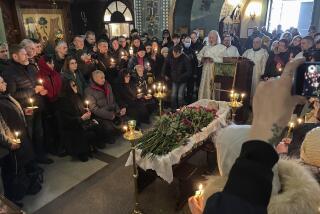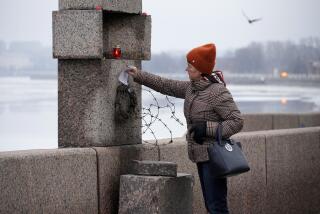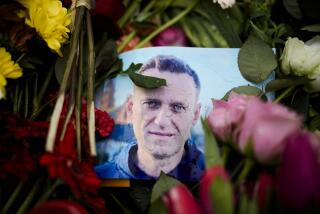Last Rites for the Last Czar Get Low Priority
- Share via
MOSCOW — The funeral in St. Petersburg next week for the last czar of Russia and his ill-fated loved ones was supposed to be an occasion for national repentance and reconciliation.
But like so much else in Russia in this confused post-Communist era, the best intentions of giving a proper burial--80 years late--to Czar Nicholas II, Empress Alexandra, three of their five children and four servants have fallen victim to posturing and politics.
Instead of the lavish ceremony of atonement for the slain royals envisioned by President Boris N. Yeltsin, the funeral is proving a fresh source of friction between church and state.
“This is a country that prefers to cling to its myths,” said Edvard S. Radzinsky, a noted historian, playwright and member of the government commission charged with proving the authenticity of the Romanovs’ remains. “People who know nothing of science have the power to reject scientific facts.
“They simply refuse to accept any proof,” Radzinsky said of the Russian Orthodox Church hierarchy, which has chosen to keep its distance from the rituals. “Instead of being an occasion for uniting Russians, this funeral may deepen the divides.”
Despite DNA tests replicated in three countries identifying the jumble of bones found near Yekaterinburg in 1991 as the remains of the executed Romanovs, the church claims to harbor doubts about the identity of what it refers to as “the Yekaterinburg remains.”
The decision of the church’s Holy Synod earlier this year to prohibit clergy above the rank of bishop from taking part in the last rites has set off a succession of religious, royal and official withdrawals from the event.
Yeltsin has decided not to attend the ceremony he personally ordered, and his political rivals have followed suit in fear that they might alienate the huge constituency of the resurgent church.
Russian Orthodoxy has been accorded the virtual status of a state religion, and the church wields powerful influence with Russians despite its centuries-old support for the country’s power structures, including the Communist Party throughout its 74-year rule.
No church prelate ever dared condemn the brutal executions of the Romanovs, who were rousted from their beds in Yekaterinburg in the predawn hours of July 17, 1918, and gunned down by a Bolshevik firing squad without trial. The corpses were trucked out of the city and dumped in a hastily dug pit.
The church is said to be reluctant to accept the remains as authentic because of its dispute with the Russian Orthodox Church abroad over canonization of the last czar. The foreign branch, founded by Russians who fled the 1917 Russian Revolution, long ago declared Nicholas a holy martyr. For the church here to agree now would expose it as a Communist collaborator. To reject sainthood would cement the rift with the church abroad. Instead, the church has simply refused to make a decision.
First Deputy Prime Minister Boris Y. Nemtsov will be the Kremlin’s representative at the funeral--a role some say the popular politician was brave to accept for all its political pitfalls. Even many prominent Romanov descendants have decided against attending in the absence of Yeltsin and Russian Orthodox Patriarch Alexi II.
As originally conceived by Yeltsin, the funeral was to have been the most elaborate state occasion since the czar’s 1896 coronation. But the protocol setbacks and Russia’s perpetual financial crisis forced the events to be scaled back.
The budget for the event has been capped at $830,000, and the guest list has been pared from its earlier thousands to about 400. European houses of royalty have mostly emulated Russia’s decision to be present at an inauspicious level. Britain’s royal family will be represented by Prince Michael of Kent, a first cousin to Queen Elizabeth II, even though the queen’s husband, Prince Philip, is a relation of the late empress and provided DNA samples to aid in identification.
Neither will the White House be sending a top emissary. When asked who would represent the United States, White House Press Secretary Mike McCurry told reporters to “check with our embassy in Moscow.”
More to Read
Sign up for Essential California
The most important California stories and recommendations in your inbox every morning.
You may occasionally receive promotional content from the Los Angeles Times.











